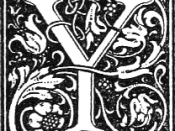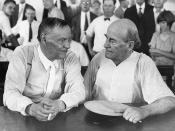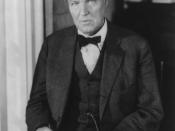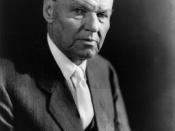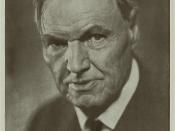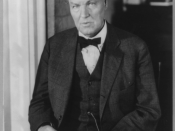Clarence Darrow is known for his great success as a defense lawyer. He was known to always take underdog cases and none of DarrowÃÂs clients were ever executed. Darrow grew up in a simple life. When he grew older and became a lawyer he was not always on the favored side at the beginning, but by the end there was no doubt in anyoneÃÂs mind that Darrow was correct. Throughout his life he chose to be a minority, making himself the ultimate non-conformist.
Clarence Seward Darrow was born on April 18th, 1857 in Trumbull, Ohio to Emily and Amirus, the village undertaker and coffin maker. Amirus Darrow was an ardent abolitionist and Emily Darrow an early supporter of female suffrage and a woman's rights advocate. Mr. and Mrs. DarrowÃÂs liberal outlooks completely shaped the views and opinion of their son, Clarence. By the early 1870s, Clarence DarrowÃÂs oratorical skills were already quite obvious.
The town members described him as "A nonconforming spirit, a skeptical mind, and freelance politics that drifted toward cynicism"(Linder 2). He always participated in town debates on the issues of the day-- always arguing the minority, always winning.
His first trial as a young lawyer was the case of Jewell vs. Brockway. This case pertained to a boy owing a man fifteen dollars for a harness that was given to him when he was taking care of the ill man. The harness was never paid for and the creditor sought to repossess the harness. Even though Darrow only earned five dollars for his work, he took the boy's case through two trials and three appellate court decisions before achieving final victory in the Ohio Supreme Court. Small stakes didnÃÂt matter to Darrow, poker player that he was. He was known for saying, "What is the difference whether one plays with a blue chip or with a white one? The important thing is to play" (Linder 2). All that was important to Darrow was that justice for all was achieved, even the poor underdog. He was a committed determinist and thatÃÂs what made him strong. He stood by his views, no matter how different they were compared to the views of common society.
DarrowÃÂs eloquence made him a great success as a lawyer but even more so a great influence on the world. This is evident in the case of Illinois vs. Nathan Leopold and Richard Loeb. His clients had already confessed to murdering a boy on his way home from school and were on their way to the scaffold before Darrow became their representation, but Darrow convinced the state that they deserved a trial by jury. By the end of the trial he plead for his clients lives by delivering a twelve hour long speech; mixing poetry and prose, science and emotion, a world-weary cynicism and a dedication to his cause, hatred of bloodlust and love of man. "If the state in which I live is not kinder, more humane, and more considerate than the mad act of these two boys, I am sorry I have lived so long" (Linder 1). Darrow agreed with the thought of an eye for an eye and believed that the proper punishment should be a life sentence for both Leopold and Loeb. The judge ended up in tears and the boys were sentenced to life in prison. Darrow was never shunned from society due to this or any of his beliefs.
Clarence Darrow was accepted into society due to his mastery of the law but was not necessarily loved wherever he went. The case of Tennessee vs. John Scopes became the trial of the century. John Scopes, a teacher in Dayton, taught evolution after it became illegal to teach in public schools and was then arrested. This trial became know as ÃÂthe Monkey TrialÃÂ. In opening statements, the trial is characterized grandly. Darrow determined that, "Scopes isn't on trial, civilization is on trial." Then Bryan replied, "If evolution wins, Christianity goes." (Linder 2). This trial becomes a battle between traditionalists and modernists to see who would dominate American culture.
Darrow was anything but welcome in this small town of Dayton. Banners decorated the streets of Dayton, chimpanzees performed in a sideshow on Main Street, members of the Anti-Evolution League sold copies of William Jennings Bryan's (the prosecutor) book, Hell and the High School, while in the surrounding hills, holy rollers rolled. Darrow was accused of slurring the Bible during the trial which weighed heavily on his reputation in this devote Christian town. He was an agnostic in the middle of a God fearing town.
Conformist would not be a word used to describe Clarence Darrow. I could not find one event in which he conformed to others. In Los Angeles during 1912, Darrow himself was on trial, charged with arranging an attempted bribe of a juror in a case involving a bombing of the LA Times building that killed 21 people. Darrow told the jury, "I have committed one crime: I have stood for the weak and the poor" (Linder 2). To Darrow, the ends meant more than means. No matter what it took to make things right in the world, Darrow would do it, no matter how much it hurt himself. He even refused a political career when William Jennings Bryan asked for help in his 1908 campaign for presidency. Justice was more important to Darrow than fame. Even though ironically, his integrity towards the law brought him a tremendous amount of fame that shall last for all the days to come.
The ability to use words well made one a hero in Darrow's time, a time that was the Age of Heroes. With this, Clarence Darrow was at the same time one of the best loved and most hated men of his time. It is hard to imagine a trial attorney achieving this status today. He stood for the weak and rebelled against conformation.
Linder, Doug. "Clarence Darrow". 2004.
